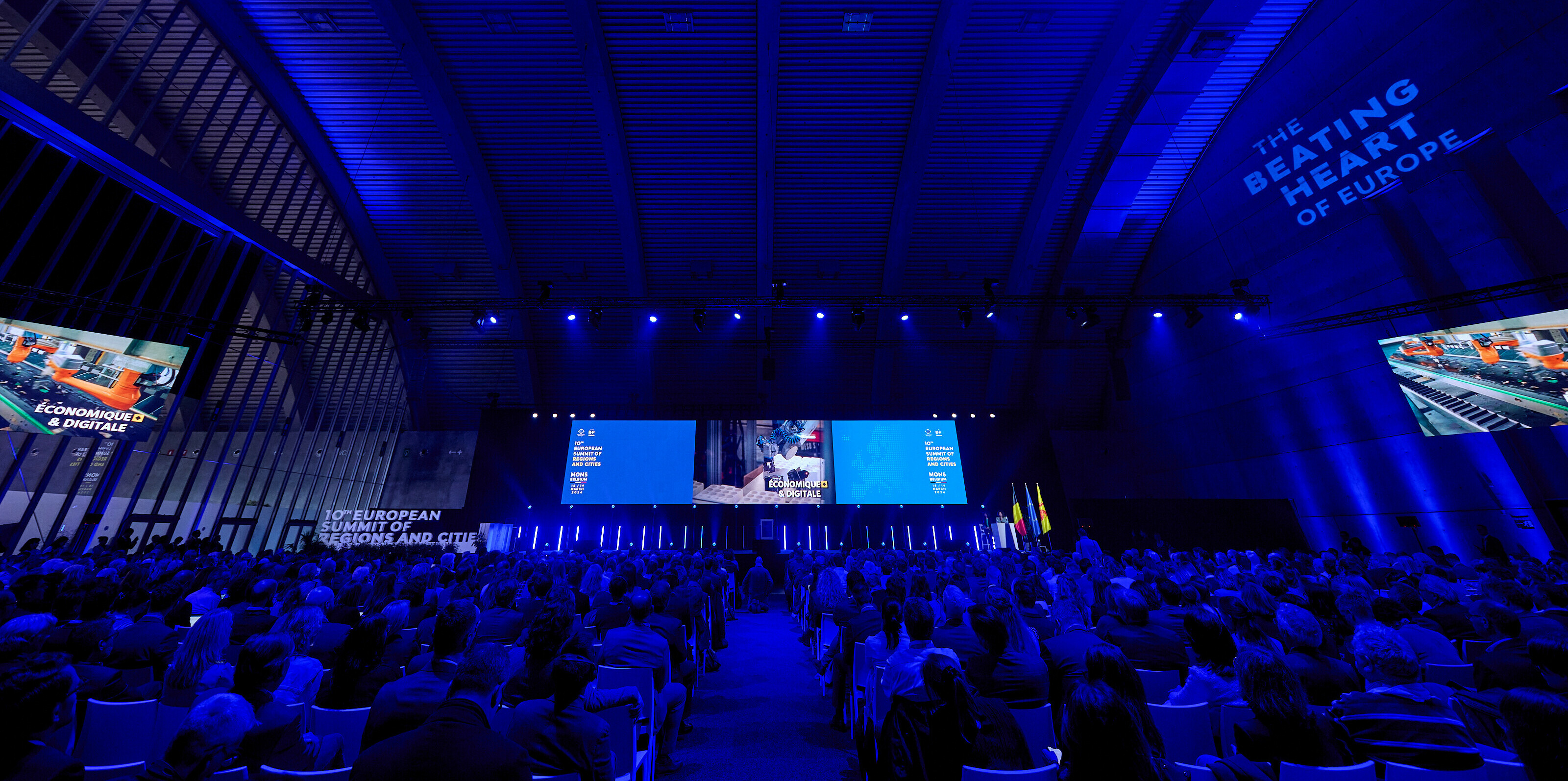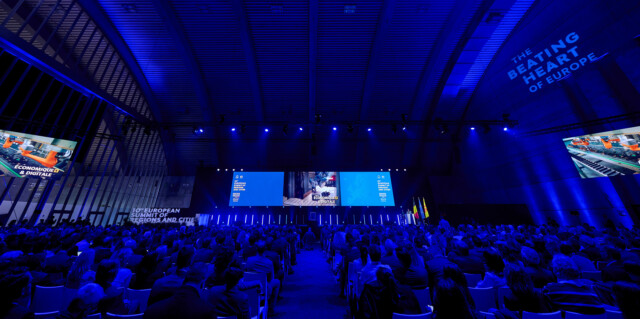Eurisy at the 10th European Summit of Cities and Regions

How can space-based solutions find their way to local and regional decision-makers’ hearts?

18 March 2024, Opening plenary session. Local and regional solutions for global challenges
Belgium – Mons – March 2024
© European Union / Nicolas Lobet / PRYZM
As part of its mission to better understand the position of local and regional authorities on the space sector, Eurisy attended the 10th European Summit of Regions and Cities in Mons, Belgium. The Summit’s theme perfectly aligned with the conference’s location: at the heart of Europe, in the city of Mons, situated at the intersection of France, Belgium, and Germany.
The city itself serves as an example of European resilience and cohesion, having endured significant difficulties during the world wars, and subsequently building a strong cultural, social and economic fabric with the help of European policies.
Cities and regions are the beating heart of Europe, but is space at the heart of our leaders’ minds?
During the Summit, local and regional political representatives were given a platform to voice their growing concerns, and a striking consensus emerged: local and regional authorities experience increasing difficulties in crisis management in the broadest sense. The aftermath of the Covid-19 pandemic, the war in Ukraine, the snowballing effects of climate change and its rising costs for local authorities, were the prevalent topics of discussion. These pressing issues, combined with the constrained budgets of local authorities, served as a catalyst for many discussions about how to address those formidable challenges.
Most debates reached the same conclusion: the need for a stronger and more inclusive cohesion policy.
Traditionally based on top-down and centralised approaches, public authorities are now calling for a shift to a bottom-up dynamic approach to ensure that “no one is left behind”. Arguing that regions and cities implement more than 70% of EU legislation and are the first point of contact for citizens, who tend to place greater trust in them, speakers and panellists tried to demonstrate that the direct involvement of local and regional authorities would result in a more robust cohesion policy, encompassing all European areas (urban, rural, industrial, coastal, sparsely populated, etc.) and involving each and every citizen.
The pursuit of a bottom-up Europe and the prioritization of integration were emphasized by both Committee of the Regions members and EU representatives as an indispensable component for a resilient, inclusive, sustainable, and overall strengthened European cohesion policy. As first points of contact, local authorities were presented as best placed to understand the needs and ambitions of young people, women, newcomers, and citizens. Consequently, it was argued that they are in an optimal position to advocate for citizen’s rights and opportunities at the European level, and to ensure that European policies safeguard these rights.
Throughout these two days, and through the different topics addressed by various speakers, Eurisy could not help but notice that there is a forgotten but valuable tool that policy makers at every level are not taking into account for their own benefit: space-based solutions and applications. This highlights the need for the space sector to persist in communicating its advantages and benefits to potential end-users and in engaging in communication activities beyond the conventional boundaries of the sector’s core niche.
Apart from a brief mention of space data during the Digital Innovation Agora, it became clear during the Summit that local and regional policy makers are not aware of the actual tools that could benefit them. Whether it is monitoring the effects of climate change to support the Green Deal objectives, ensuring the sustainability and resilience of urban, rural or coastal areas, preventing and managing disasters such as floods and fires, or ensuring and monitoring the logistics of vaccine deliveries during Covid-19 or humanitarian support during conflicts, space-based applications and satellite data have a role to play and are not as inaccessible as one might think.
Over the years, with the mission and ambition to assist decision-makers and public authorities, Eurisy developed the largest database in Europe of stories of successful implementation of operational satellite applications. https://www.eurisy.eu/stories/
Acting as a facilitator, matchmaker and adviser, Eurisy stimulates dialogue and collaboration between public institutions at any level, industry and academia, space and non-space sectors, promoting the benefits of space application to respond to today’s challenges by sharing experiences and best practices.
Beyond satellite-based services and applications that enhance informed and efficient decision-making for public authorities, the space sector has much more to offer cities and regions. It is a growing sector that can contribute to the upskilling of citizens, foster economic growth and competitiveness, create professional and educational opportunities, and build and promote cooperation between countries, regions, and municipalities, for example through the exchange of best practices. The latter is particularly facilitated by projects such as Copernicus Connection, which aims to share knowledge and experiences between European regions and promote the operational use of Copernicus data and services by local and regional authorities, focusing on France, Germany and Switzerland.
Decision-makers have called for a stronger European cohesion policy, but they may not realise that one of the most effective cohesion tools is already at their reach.
